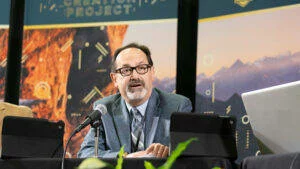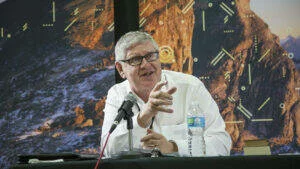 My main point in my original essay was not that science has not been contaminated by taste, prejudices, and motivations. Of course it has been. My main point was that when judging a scientific theory, when debating its alternatives, when deciding which scientific interpretation is better, when demolishing bad theories, motivation is not a scientific argument, and it certainly isn’t a valid criterion of scientific truth.
My main point in my original essay was not that science has not been contaminated by taste, prejudices, and motivations. Of course it has been. My main point was that when judging a scientific theory, when debating its alternatives, when deciding which scientific interpretation is better, when demolishing bad theories, motivation is not a scientific argument, and it certainly isn’t a valid criterion of scientific truth.
Pelé, Maradonna, and Penalty Kicks
Let me try to make my point clearer by offering one more analogy from soccer. Suppose the Brazilian team headed by Pelé is playing the final game of a world cup, in heaven perhaps, with the Argentinians headed by Maradona (what a game!).In the same way, I believe that data should be the boss in judging disputes in science. Imagine also that a supposedly unbiased referee (from USA) at the last minute of the game calls for a controversial penalty kick in favor of Argentina. That call would likely give the Argentinians the cup.
What if the Brazilians then complain that the penalty should be cancelled based on the motivations of the referee? For instance, they could say: Yes, the referee is American, but we have just discovered his parents are, guess what, from Argentina, and he is a big fan of Maradona. Would that be a sufficient argument to cancel the penalty? Of course not! Regardless of the possible motivations of the referee, wouldn’t it make more sense to consult the Video Assistant Referee and check the video of what happened?
Data should be the boss in resolving the question of whether the penalty was correct. In the same way, I believe that data should be the boss in judging disputes in science.
Rationality is Biblical
Science’s emphasis on data and logic to lead us to new knowledge is not simply a product of “modernism.” Rather, this emphasis springs from the core of human rationality itself. For those of us who are Christians, the idea that humans can ascertain truth by relying on data and logic fits well with what the Bible teaches about human nature. In Romans 1:20, we are told that even those who do not know God can come to some knowledge of God by seeing his qualities clearly displayed in nature. In other words, the data of nature can teach people something about the true God regardless of their cultural or religious presuppositions. Similarly, throughout the Bible we see God appealing to humans to “judge for yourselves” (Luke 1:57) and “come . . . let us reason together” (Isa. 1:18). In other words, God is asking people to use their God-given rational faculties to confirm for themselves that what he is saying is correct. This suggests that even in our fallible condition we retain some capacity to arrive at truth from the data if we want to do so.
Based on these biblical teachings, Christian theologians and philosophers have long discussed the existence of “general revelation,” the idea that human beings have the potential to access truth through the data of his creation and not just through the Bible. I am a scientist, not a theologian, but it seems to me that if you want to understand science theologically, it should be regarded as part of general revelation.
Positive Assumptions
Can assumptions and motivations positively influence science? Sure—sometimes. I would agree that science is based on an assumption that the universe is rational and that we have reliable rational minds to rationally “listen” to data. As a Christian, I further believe that this assumption that the universe is rational accords well with my understanding of how God created the world. Thus, as I acknowledged in my original essay, I agree that Christian theism can supply a positive personal motivation to do science.
As a mass spectrometrist, I like to mention J. J. Thomson, who himself, along with his son and seven of his pupils, all won Nobel Prizes. In addition to being a brilliant scientist, Thomson was also a sincere Christian, and he expressed the connection between his faith and his science in a speech to his colleagues, where he said:
“As we conquer peak after peak we see in front of us regions full of interest and beauty, but we do not see our goal, we do not see the horizon; in the distance tower still higher peaks, which will yield to those who ascend them still wider prospects, and deepen the feeling, the truth of which is emphasized by every advance in science, that ‘Great are the Works of the Lord.’”
As a Christian, I rejoice in this statement by Thomson. Nevertheless, the ultimate test of Thomson’s science in my view was not his Christian motivation. It was whether his scientific findings were confirmed by the data.
As a practicing scientist, I believe scientists should try to approach questions as much as possible with the attitude that they don’t know the answer until they have seen what the data say.Motives and assumptions exist in science, but they must be open to being challenged by the data. When they let their assumptions guide them without making sure those assumptions are in line with the data, it can be disastrous.
For example, the current operating assumption held by many scientists that matter is all that was, is, and will ever be, has led to many supposedly scientific claims that lack actual support from the data. It has made us believe—without real evidence—that unguided material processes must be capable of producing a universe that is exquisitely fine-tuned for organic life and a planet that is fine-tuned for scientific discovery. It has made us believe that complex living organisms developed through an unguided process—despite data showing that nature is filled with ingenious solutions to problems that would, in the course of our normal experience, require tremendous foresight and planning. This same materialist assumption has fueled the belief that life spontaneously arose by accident from a “primordial chemical soup”—despite an accumulation of data showing that chemical laws would likely have prevented any viable biomolecule from forming. Finally, this materialist assumption has led many biologists to conclude we are relatives of chimpanzees—despite data showing a vast array of genetic, proteomic, and intellectual differences between the two species.
Motives and assumptions exist in science, but they must be open to being challenged by the data.
Motives and assumptions also shouldn’t be used as an excuse for evading legitimate scientific debate. Unfortunately, focusing on the motivations of scientists we disagree with can provide an all-too-easy rationalization to ignore data we don’t like. In 1996, biochemist Michael Behe published his book Darwin´s Black Box, which masterfully presented data on the irreducible complexity of the flagellar motor, the immune system, the blood clotting cascade, and so many other marvelous biochemical systems. But while some scientists engaged with Behe on the science, many of Behe’s critics were content to dismiss him based on his supposed motivation; and when Behe and others responded extensively to the few substantive criticisms made, these responses were largely ignored—a pattern of behavior that recurred with Behe’s books The Edge of Evolution and Darwin Devolves. The preoccupation with Behe’s motives short-circuited the search for the truth.
In the real world, science is often a zigzagging journey towards the truth. Sometimes our motivations and biased interpretations delay the progress of science, moving us to the right, sometimes to the left, and sometimes deviating us from the proper course, for decades, or in the case of Darwin’s theory, for more than 150 years. But it is my hope that the power of data will always—sooner or later—come to rescue us from our mistakes and push us back to the proper track (even against our will). If we let the data speak for themselves, I believe we are more likely to come closer to the truth.







Comments
Be the first one to make a comment!